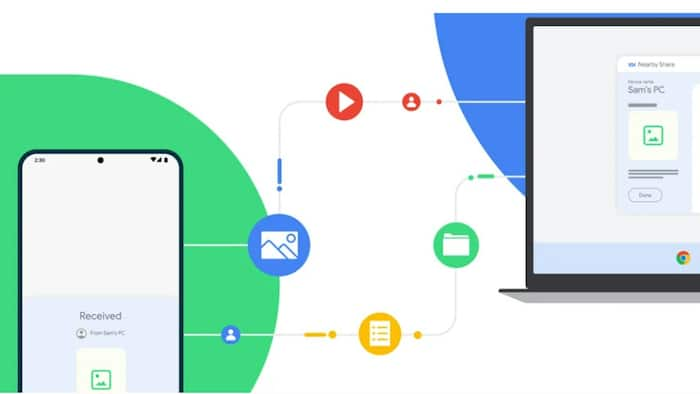
Written By Shweta Ganjoo
Published By: Shweta Ganjoo | Published: May 08, 2023, 12:13 PM (IST)


Google has announced that it has started rolling out its Nearby Share feature to all Windows PC users across the globe. This feature will enable Android device users to transfer data to their Windows PCs and vice versa seamlessly. Also Read: Google Maps Tips To Save Time While Traveling
It is worth noting that Google had first announced Nearby Share feature for Windows PCs back in March this year. However, at the time, the feature was available in select countries. Now, nearly a month later, the company has announced that it is rolling out Nearby Share feature for Windows to users across the globe. Also Read: Wikipedia Signs AI Access Deals With Microsoft, Meta, Perplexity: Here's Why
“We are very excited to announce that Nearby Share for Windows is now available worldwide, so even more of your devices can work better together,” Google wrote in an update on the support page.
“Whether it’s sharing a photo, link or document, there are many ways Nearby Share can help you throughout your day. Try Nearby Share Beta for Windows today,” the company added.
That said, the Nearby Share feature isn’t available for all Windows PCs. Users need to fulfill certain conditions in order to send or receive files via Nearby Share feature. Here are all the details:
— A computer with a 64-bit version of Windows 10 and up.
— An Android device with Android 6.0 and up.
— Bluetooth turned on, on both the Android smartphone and Windows PC.
— Wi-Fi turned on, on both the devices.
— Both the devices should be connected to the same network.
— Both the devices should be within 16 feet or 5 meters of each other.
— ARM devices not supported.
Step 1: Download and install Nearby Share Beta onto your Windows PC.
Step 2: Open the Nearby Share Beta app on your Windows PC and sign in the app with the same Google account that you are using on your Android smartphone.
Step 3: Under ‘Visible to others as’ option, choose the name of your device.
Step 4: Under ‘Receiving’ option, choose who can share with you.
Step 5: Select Done.
Step 1: Open the Nearby Share Beta for Windows app on your PC.
Step 2: At the top right, select Settings and then select Device visibility.
Step 3: Choose your visibility:
— Everyone: Your device will be visible to anyone nearby with Nearby Share turned on.
— Contacts: Your device will be visible to your nearby contacts.
— Your devices: Your device will be visible to your devices with the same Google Account.
— No one: Your device will not be visible to anyone.
Step 1: Open the Nearby Share Beta for Windows app on your Windows PC.
Step 2: Select and drag a file into the app window.
Step 3: Select the device you want to share your file with.
Step 4: If you get a PIN, make sure it matches the one on the receiver’s device.
Step 5: Select Share.
Once the receiver confirms the share, your file is sent.
Case 1: When someone uses Nearby Share to send content to you, you will get a notification. If it shows details about the sender: Select Accept or Decline.
Case 2: If you get a PIN, make sure it matches the one on the sender’s device. To get the content, select Accept. The file is saved to your ‘Downloads’ folder.